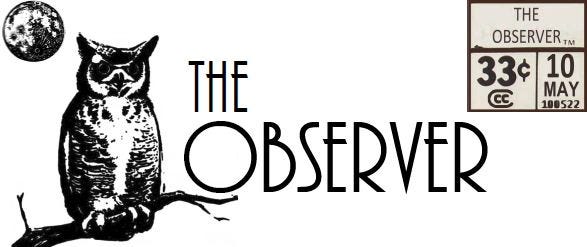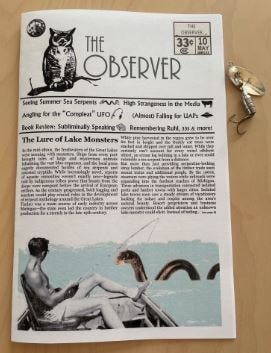In July 2001, Michael A. Hoffman II released his first book about the covert machinations of the occult elite—Secret Societies and Psychological Warfare warned that the governing “cryptocracy” viewed the year 2001 as an important “gateway” for humanity’s transformation.
As a result, he believed a symbolic false-flag event that would “serve as the climax entry point for the epoch of human alchemy” was imminent.
Two months later, the 9/11 World Trade Center attacks irrevocably changed society.
Hoffman’s early work didn’t just touch the third rail—it duct-taped both hands to the track like it was trying to win a game of ‘Edward 40-hands.’
We’re pretty sure if our parents had been aware of his research, they really would’ve warned us against reading it. The connections drawn between government- endorsed ritual slayings, Freemasonry, and occult-coded subliminal messages were unsettling and morbidly fascinating. His willingness to explore the seedy underbelly’s seedy underbelly resulted in a tract that opened readers’ minds like a psychoactive drug. It’s a hard act to follow, and his latest contribution, Twilight Language (2021), feels more like a muted head-trip than a heroic dose of acid.
Hoffman alleges that the planet is run by a sinister element embedded within the world’s power structure. This “cryptocracy” exerts control through purposely planted subconscious signals and thinly-disguised occult ceremonies. Instead of traditional political shenanigans, they rely on “ritual magic for shaping and processing the human psyche”—including “human sacrifices” under the guise of mass shootings and serial killings.
The mental anguish generated by these scripted public traumas is enhanced through a process known as “Revelation of the Method”—whereby the cryptocracy expose themselves as the responsible party for a heinous act. When the dust settles after an orchestrated incident, the group-mind is saturated with “dream-like, hypnotic cues dropped by the media and the government” indicating their involvement. Subtle hints are transmitted via “news conferences, book illustrations, audio recordings and films,” which act like psychic bullhorns, amplifying the effects of the “alchemical psychodrama.”
Why snitch on yourself after the fact? Deliberate disclosure is assumed to increase the ritual’s power.
Witnessing criminals get away with their crime is “hugely demoralizing to the American people,” and portrays the cryptocracy as an unstoppable force, immune from retribution.
When the masses are let in on the dirty secret—but fail to retaliate—their lethargic response “instills deeper hypnosis, paralysis, demoralization, misdirection, and confusion.” This trance-like state leaves their audience easier to manipulate. Hoffman considers the technique “among the most formidable mind control devices in the psychological warfare arsenal.”
These rites are accompanied by a form of occult doublespeak known as “twilight language.” It serves as the cryptocracy’s calling card—a “signal to the in-crowd” that the situation is under control. The secret lexicon is designed to seize “the dreaming mind” by issuing subconscious commands—an idea that finds refuge in the archetypes of Jungian philosophy. Hoffman notes that it’s merely the continuation of an ancient practice: “What the masons called word magic, scientists today call neurolinguistics. Advertisers term it branding.”
An example of twilight language can be extracted from the JFK assassination. Lee Harvey Ozwald’s televised sacrifice of the sitting president ushered in an upside-down world of Oz. He was later publicly executed while in police custody by Jack Ruby (as in “Red Slippers”). These latent language connections are deployed to subliminally attribute the traumatic event with the power of the elite cabal.
A fear of transhumanism also permeates the pages. Hoffman interprets technology’s rapid advance as part of the acceleration of the “Reign of Dead Matter”—he’s literally afraid that robots will come to dominate and dictate our lives. The marriage of man and machine is perceived as an ominous union hastening the arrival of AI-overlords. As evidence, he cites the increasing autonomy of military weapon systems, television’s ubiquitous presence (he suspects that TV programming keeps humanity stuck by replaying images of the past for us to mimic), and the “digitally-generated illusion” of our current reality. It’s hard to argue with his premise.
There are times when you come to the end of one of Hoffman’s sentences and say to yourself: ‘WTF did I just read?’ As soon as you think the esoteric concepts are starting to make sense, he goes on a tangent and describes twilight language as “a departure from authentic apprehension and expression of verisimilitude, into a degraded burlesque of communication which repudiates the ontological search for knowledge of ourselves as images of the divine, within the natural world of wonder.” Huh? Despite his astute analysis, sometimes Hoffman’s prose reads more like a manifesto than a manuscript.
Ultimately, the book suffers from a lack of fresh, well-developed examples. His first foray was full of elaborate, ‘out-there’ analysis explaining how movies like The Matrix could “sufficiently program even the most wholesome eagle scout … to the level of the first degree of occult apprentice.” Twilight Language offers up a few insights along those lines (like meeting with Woody Harrelson about his dad’s involvement in JFK’s murder and accusing a Progressive Insurance commercial of containing hidden messages), but his conspiracy-cocktail tastes less potent this time around.












Twilight Language and it's predecessor Secret Societies and Psychological Warfare are two of the most dense, purposefully constructed reference books I've ever read!
It's disappointing that you're giving this anti-semite a platform, but he -- like Nostradamus before him -- can write reams of prophecy and eventually, like monkeys typing Shakespeare, eventually, this moron will get something right.